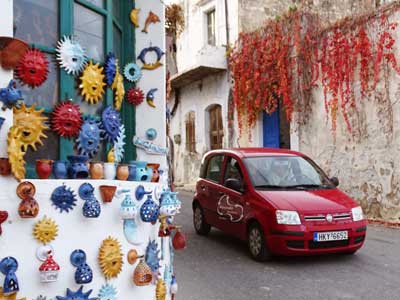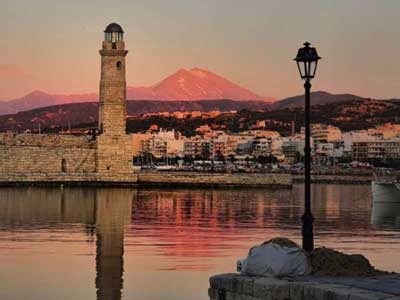What Happens on October 28, 1940?
Oxi Day – and What It Means
Oxi Day is celebrated every year throughout Greece on October 28th. On this day, the Greek people commemorate the Greek dictator Jiannis Metaxas’ rejection of an ultimatum given to him by Italian dictator Benito Mussolini. In this ultimatum, he ordered the Italian army to be given free access. This would allow them to occupy strategic regions. Metaxes’ response was in French, the language of diplomacy at the time;
‘Alors, c’est la guerre’
which meant something like; ‘Then it’s war’. This French sentence was quickly translated into the word Oxi. This is the word for ‘no’ in the Greek language.


In response to Metaxa’s refusal, Italian troops attacked the Greek borders. This was the beginning of Greece’s participation in WWII. The Italian army crossed the Greek-Albanian border into the mountainous Pindos region of northern Greece. There they encountered fierce and unexpected resistance, mainly due to the difference in terrain. They also had to deal with Cretan soldiers. British troops had occupied Crete earlier that month, which meant that the free Cretan troops, who were known to be the fiercest of the Greek soldiers, were also able to fight in these Pindos mountains.
As the Italian troops moved south towards the city of Ioanina, the Greek/Cretan troops moved into the mountains, bombing the Italians from above. This resulted in the Italians having to retreat into Albania for several months.
Churchill wrote about this::
Greeks do not fight like heroes, heroes fight like Greeks.
In March 1942, Mussolini himself led a counterattack to drive the Greeks out of southern Albania. The attack failed, which was a further humiliation for the Italian leader. By April, the small Greek army had held out for six months. Unfortunately, the Germans had crossed the unguarded border of Yugoslavia in the meantime. Initially held back at the Metaxas line, the Germans defeated the Greeks fairly quickly.
In these six months, Prime Minister Metaxas had died. His successor Alexandros Koryzis had committed suicide and Mussolini had been made a fool of a few times.
But the Germans thus raised the swastika flag on the Acropolis. Greece had eventually fallen, but it had taken much longer than, for example, the invasions of France and Poland. The ‘withdrawal’ attack in Greece cost Hitler five precious weeks in the spring, with the result that his attack in Russia brought him into the Russian winter, with all the well-known consequences.





Jaarlijkse viering van oxi dag; Παρέλαση 28 Οκτωμβρίου (= de parade van 28 oktober)
Tijdens de oorlog werd 28 oktober al jaarlijks herdacht door de Grieken en na de tweede wereldoorlog werd het een nationale feestdag. Op deze dag worden festiviteiten georganiseerd, belangrijke met militaire en studentenparades. Gebouwen worden gedecoreerd, waarbij de Griekse vlag vol trots wordt getoond.
onzichtbare hoort en ziet u de laatste vrije uitzending van radio Athene, op de ochtend van 27 april 1941. Griekenland en Athene waren onder Duitse bezetting tot 12 oktober 1944.
Beschikbare Routaki routes:

Rijdt van Heraklion terug naar het pottenbakkers dorpje Margarites (in de regio Rethymnon) met Routaki route 42 – ‘Margarites’.

U komt door het plaatsje Mirtos, bekend vanwege haar vele zonnige dagen, tijdens Routaki route 59 – ‘Kalamafka’

Fotografeer en bezoek het klooster van Myriokefala in auto trip: Rethymnon – ‘Myriokefala’ – Nr. 32

this topic is mentioned in….
Excerpt from route 32 – ‘Myriokefala’ The Spirit of Crete: A Drive from Rethymno to Georgioupoli via Myriokefala in which the following is said…..
–
“Oxi Day is celebrated annually in Greece on October 28th, marking the country’s rejection of Italian dictator Benito Mussolini’s ultimatum in 1940. In response to the demand for free passage of the Italian army into Greece’s strategic sites, Greek dictator Jiannis Metaxas famously replied with “Alors, c’est la guerre”, then, its war. This phrase was soon simplified to the Greek word “Oxi,” meaning “NO.”
Following Metaxas’ refusal, Italian forces attacked the Greek border, drawing Greece into World War II. The Italian troops entered the mountainous Pindos region in Northern Greece, encountering fierce resistance, particularly from Cretan soldiers.

What you might also be interested in:
City walk Heraklion – GPS audio tour.
You can experience this vibrant city with the interactive GPS app VoiceMap. Install the app for free and select ‘Heraklion’.
In the webshop on this site, you can purchase a code that provides access to all the information you need to enjoy a fantastic day in Iraklio.
Would you like to get an impression first? Then start by reading this page about Heraklion.

Or you can read one of the following articles:
Read about Agios Nikolaos and why it’s so important for Crete and tourism.
Visit the Agios Titus church during the GPS city walk through Iraklio with Voicemap.
Wait till sun set and admire the lighthouse of Rethymnon with the audio tour




